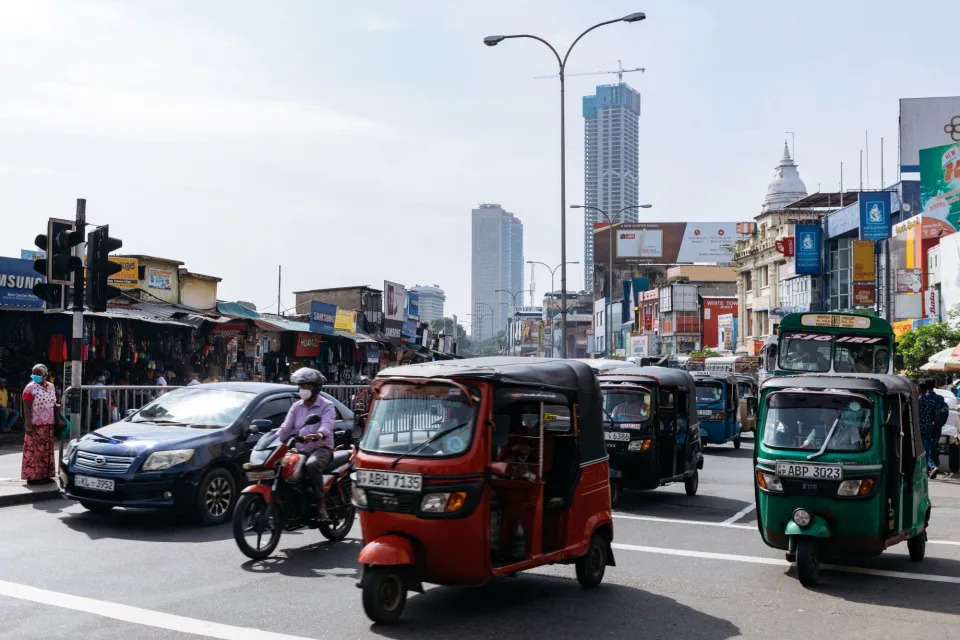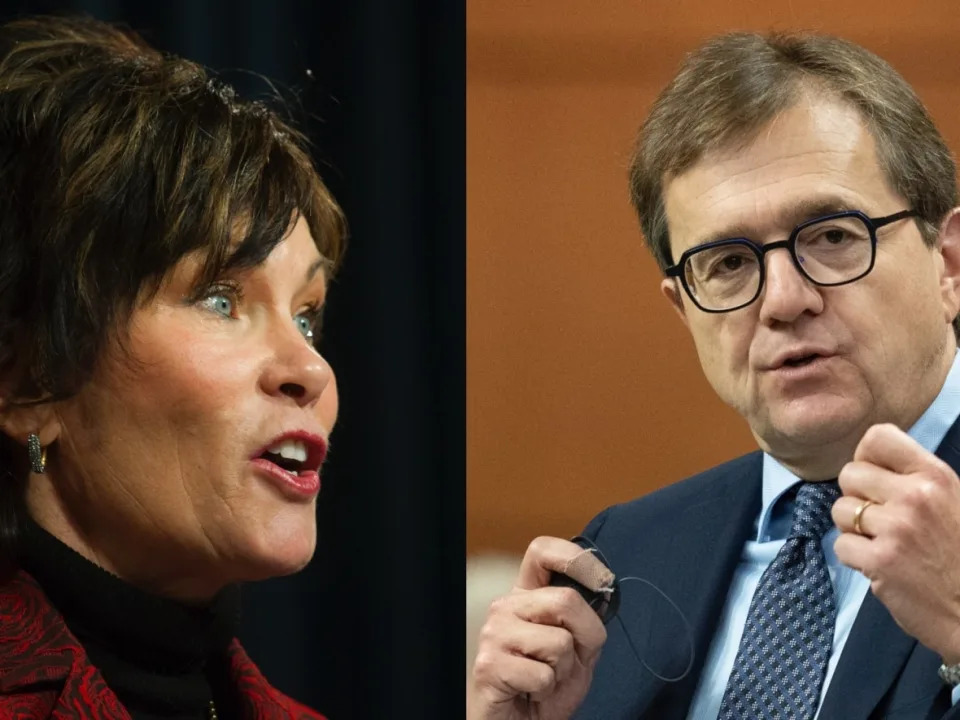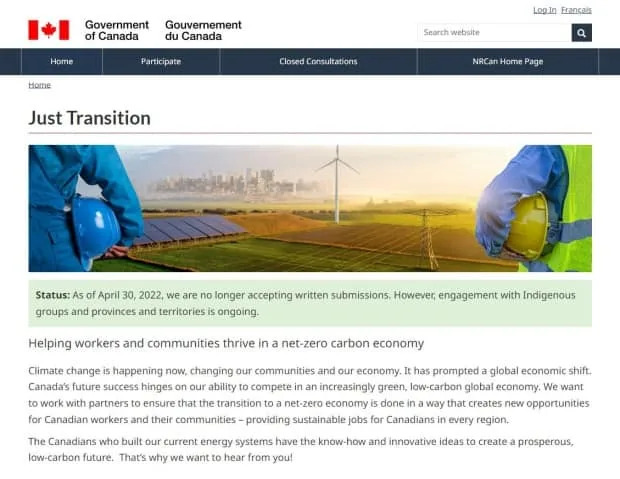Gráinne Ní Aodha and David Young, PA
Mon, January 9, 2023

Health and social care workers in Northern Ireland are to join a 24-hour strike planned for later this month in a bid for better pay.
Trade union Unite said that 87% of its healthcare workers across Northern Ireland’s five trusts and the ambulance service voted to take industrial action over the next two months.
It will mean that 4,000 health and social care workers represented by Unite will go on a 24-hour strike on January 26, followed by two 48-hour strikes on February 16 and 17, 23 and 24.
They are the latest group of healthcare workers to join the rolling industrial action taken by healthcare workers at Unison, Nipsa and GMB for better pay.
In December, members of three unions formed picket lines at hospitals and other health service facilities.
Hundreds of appointments and services were also affected before Christmas, after the Royal College of Nursing took part in two 12-hour strikes across Northern Ireland, England and Wales.
“If proof were needed of the determination of NHS workers to fight for a better deal it’s here in the 87% vote recorded in the Trusts in Northern Ireland,” Unite general secretary Sharon Graham said.
“In the absence of a functioning Stormont Executive, Prime Minister Rishi Sunak needs to show some leadership, bang some heads together, make sure that we can get back to negotiations and offer NHS workers in Northern Ireland a better deal.”
Lead regional officer for Unite in health in Northern Ireland, Kevin McAdam, confirmed the union’s members would be joining the picket lines with members of other health unions with the first 24-hour action on January 26.
“Unite’s nearly 4,000 health members in Northern Ireland have returned a 87% rejection of the imposition of a below-inflation pay award to health workers in the region,” he said.
“In the absence of action to address our members’ pay claim, we have been left with no alternative but to notify employers of strike action.”
Mon, January 9, 2023

Downing Street is believed to be considering a one-off payment for nurses after rejecting the idea before Christmas.
About six weeks ago Steve Barclay, the health secretary, floated the idea of giving nurses a single payment to cover the increased cost of living this financial year, ending in April - but Downing Street and the Treasury rejected it, Sky News understands.
It is understood Number 10 is now warming to the idea as nurses prepare for strike action on 18 and 19 January after walking out for the first time before Christmas.
Unions say 'an insult' meeting to last 'just 45 minutes' - live politics updates
Rishi Sunak on Monday refused to confirm or deny if the government was considering a one-off payment but said the most important thing is "talks are happening".
The Royal College of Nursing has said it would accept a pay rise of about 10% - down from its initial demand of 19% - if the government could meet them halfway.
The union said it would call off strike action if the government discussed pay for this financial year, but ministers have said that was all decided long ago and they only want to talk about next year's pay.
RCN England director Patricia Marquis told Sky News: "We'll be interested, of course, to hear what Steve Barclay's got to say.
"But unless we're able to have some conversation about this year's pay award, then sadly this isn't going to resolve the dispute that we currently have with the government."
Read more: Who is striking and when this month?
Health union bosses are meeting Mr Barclay today for talks on pay and conditions in a major break-through for workers after the government initially said it was for the independent pay review bodies to negotiate pay, not ministers.
The government is also meeting train and teachers' union leaders ahead of further strikes by those industries.
Mr Sunak said the government's door "is always open" to unions for talks on pay if they are "based on what's affordable, what's responsible and what's reasonable".
A deal is not expected to be agreed upon today for any of the unions, but the fact they are meeting is an important step forward.
Junior doctors - any doctor below consultant level - have started voting today on whether to carry out a "full walkout" in March, with a result expected by the end of February.
About 45,000 British Medical Association (BMA) members are being balloted as they call for better pay, having been excluded from an NHS pay rise this year because their contract is subject to a multi-pay deal, agreed in 2019 and ending in March, that gave them a 2% rise for 2022/2023.
The BMA said junior doctors in England have seen a real-term pay cut over the past 15 years, which amounts to a 26.1% decline in pay since 2008/9.
The union confirmed it has not been invited to today's pay talks with ministers, who it says have recommended they again get a 2% pay rise next year.
Strikes set to go ahead after ‘insulting’ talks with Health Secretary
PA Reporters
Mon, January 9, 2023
Planned strikes by healthcare workers looked set to go ahead, after talks between trade unions and the Government were branded “bitterly disappointing” and an “insult”.
Earlier, Prime Minister Rishi Sunak said he was “happy to talk about pay” with unions as ministers held a series of meetings aimed at ending a wave of industrial unrest in the NHS and on the rail network.
However, both the Royal College of Nursing (RCN) and Unite criticised the meeting with Health Secretary Steve Barclay, accusing ministers of “intransigence”.
Joanne Galbraith-Marten, director of employment relations and legal services at the RCN, said in a statement: “There is no resolution to our dispute yet in sight.
“Today’s meeting was bitterly disappointing – nothing for the current year and repeating that ‘the budget is already set’ for next year.
“This intransigence is letting patients down. Ministers have a distance to travel to avert next week’s nurse strike.”
Unite said any suggestion that a one-off pay reward could be made in exchange for a boost in productivity was “absolutely ludicrous”.
While other trade unions said that “progress” had been made, there was no sign that enough had been made for planned strikes to be called off.
Unite negotiator Onay Kasab, speaking after the meeting with Mr Barclay, accused the Government of telling staff they would need to “justify” a payment through productivity.
“This isn’t a factory we’re talking about, we’re talking about people who are working well beyond their contracted hours anyway just to get the job done because they care so much.

Health Secretary Steve Barclay (Stefan Rousseau/PA)
“So, for the Government to be talking about productivity in exchange for a (payment) is an insult to every single one of our members.”
A Department of Health and Social Care (DHSC) insider rejected Mr Kasab’s comments – and said he had not been one of the union representatives actually around the table with Mr Barclay.
The source said talk about productivity and efficiency improvements had been linked to the 2023/24 pay settlement, rather than a one-off payment.
Getting the NHS to work more efficiently could allow next year’s pay award to be “topped up”, the source suggested.
Mr Sunak had earlier not denied suggestions the Government was considering a one-off payment to help NHS staff deal with the soaring cost of living, but said any pay settlement would have to be affordable and not further increase inflation.
An ally of Mr Barclay said the issue of a one-off payment was raised at the meeting by the unions, rather than the Health Secretary.
Mr Barclay “listened to what he had to say and agreed to take it away,” the source told the PA news agency, “but that wasn’t in the context of efficiency and productivity”.
Alongside talks with health unions, teaching unions were holding talks with Education Secretary Gillian Keegan ahead of announcements this week over whether their members will go on strike.

(PA Graphics)
Rail minister Huw Merriman called in train workers after sustained action crippled services, with only one in five trains running between Tuesday and Saturday.
Mr Kasab said: “I emphasise the thing to get out of today that is absolutely clear is that they want our members to give more in order for it to consider a payment. That is absolutely outrageous.”
He said there had been no “detailed” discussion of what a pay settlement might look like, adding that the talks had left him “very angry”.
He added: “The Government have missed yet another opportunity. We came here in good faith.”
After the meeting, the GMB said that ambulance strikes would go ahead as planned on Wednesday, adding that the talks “fell well short” of anything needed to stop the walk-out.

GMB’s national secretary Rachel Harrison (House of Commons/PA)
More than 10,000 GMB members are expected by the trade union to take to picket lines on Wednesday.
“There was some engagement on pay – but not a concrete offer that could help resolve this dispute and make significant progress on the recruitment and retention crisis,” said Rachel Harrison, GMB’s national secretary.
“The public expects the Government to treat these talks seriously – it’s time they got on with it.”
Sara Gorton, head of health at Unison, told reporters that “progress” had been made but said there had been no “tangible” concessions.

Sara Gorton, head of health at Unison, speaks to the media after a meeting with Health Secretary Steve Barclay (Yui Mok/PA)
“It was a very civil meeting. We did actually manage to talk about pay – we didn’t get the tangible concessions that we might have hoped for that would enable us to call off the strikes later this week.
“But it was definitely progress when you’re in a room with the Secretary of State talking about pay, I think.
“He’s asked for our help to help with the Treasury to make the case for investment. We’ll certainly do that.”
Physiotherapists also said they would be announcing strike dates later this week despite the talks.

(PA Graphics)
Elaine Sparkes, assistant director at the Chartered Society of Physiotherapy, said: “Although the meeting was more constructive this time, there is nothing tangible on the table.
“As such, we’ll be announcing the first of our strike dates later this week as we continue to push for a fairer deal for our members and their colleagues.”
The Government had previously refused to discuss wages for nurses and other public-sector workers, insisting those were matters for the independent pay review bodies, but over the weekend Mr Sunak hinted at movement.
On Monday, Mr Sunak declined to get into the “specifics” of the Government’s approach but said that he was “really pleased that union leaders accepted ministers’ invitations to come in today to have discussions across the board and that’s a really positive development”.

Prime Minister Rishi Sunak (Henry Nicholls/PA)
“On pay, we’ve always said that the Government is happy to talk about pay demands and pay issues that are anchored in what’s reasonable, what’s responsible, what’s affordable for the country.”
Downing Street earlier warned that concerns about inflation had not gone away as the Government prepares for the next round of pay talks for 2023/24.
The Prime Minister’s official spokesman said the Government was open to listening to trade unions’ concerns.
“We are happy to listen to the pressures they think they are under, what they think is fair, responsible and affordable, and likewise we will provide detail about what we think is affordable, and also the challenge that inflation poses to all of this as well.”

Mick Lynch, general secretary of the Rail, Maritime and Transport union (RMT) leaves the Department of Transport in Westminster (James Manning/PA)
Elsewhere, RMT general secretary Mick Lynch dodged questions about progress in rail talks but said that further discussions would take place.
Mick Whelan, general secretary of train drivers’ union Aslef, gave a shrugging gesture as he left the Department for Transport but also declined to give any detail of the meeting.
The National Education Union said that “no concrete progress” had been made in its talks with the education secretary.
Kevin Courtney, joint general secretary of the NEU, said: “While there is the thought of further meetings, there is no sense of concrete progress as yet. There is no offer, there is no change.

Joint Secretary of the National Education Union Kevin Courtney, in Westminster (Dominic Lipinski/PA)
“There are further discussions to happen that we will engage in while still urging our members to vote in the ballot.”
Mr Courtney added: “There is nothing so far that would dissuade us from taking industrial action because we think these meetings are only happening because of the threat of industrial action.”
Business Secretary Grant Shapps has said ministers were seeking a more “collaborative approach”, telling BBC Radio 4’s World at One programme: “It is a new year. We are very keen to see these strikes come to a conclusion. We want to see a collaborative approach.”
Junior doctors vote on whether to walkout in March in row over pay
Alan Jones, PA Industrial Correspondent
Sun, January 8, 2023

Thousands of junior doctors in England will start voting on Monday on whether to strike over pay in the latest outbreak of industrial unrest sweeping the country.
Around 45,000 members of the British Medical Association (BMA) are being balloted, with the result due at the end of February.
The BMA has told the Government if there is a yes vote, junior doctors will begin their action with a 72-hour “full walkout” in March.
It urged the Health Secretary to meet doctors and negotiate a solution to avoid strikes.
The association said Steve Barclay is the first Health Secretary for over 50 years to continue to “ignore” all invitations from the BMA to meet doctors to discuss their pay, making attempts to find a negotiated settlement “virtually impossible”.
The BMA said successive governments have overseen 15 years of real-terms pay cuts for junior doctors in England, which amounts to a “staggering and unjustifiable” 26.1% decline in pay since 2008/09.
The BMA said patients are suffering and exhausted staff are burning out and leaving the NHS and yet the Government “fails to see the crisis in front of it”.
Ministers are accused of ignoring all the evidence to the contrary and preferring to treat the public as “fools” with assurances the NHS has all the resources it needs.
The Government’s door is “firmly shut to dialogue”, let alone talks, so there is no option left other than to ballot junior doctors in England for strike action, the BMA said.
Dr Vivek Trivedi and Dr Robert Laurenson, co-chairmen of the BMA junior doctors committee, said: “The Prime Minister says his door and that of the Health Secretary are ‘always open’.
“But after more than a decade of pay cuts, no offer to restore our pay has been made and all our calls to meet and letters to the Health Secretary and his immediate predecessors have been ignored.
“When we are faced with such resolute ongoing silence and there is no agreed settlement on the table, then we are left with no choice but to act.
“Junior doctors are not worth a quarter less than they were 15 years ago nor do they deserve to be valued so little by their own Government. Pay erosion, exhaustion and despair are forcing junior doctors out of the NHS, pushing waiting lists even higher as patients suffer needlessly.
“The Government’s refusal to address 15 years of pay erosion has given junior doctors no choice but to ballot for industrial action. If the Government won’t fight for our health service then we will.
“It is particularly galling for junior doctors to see the Government repeatedly justify huge real-terms pay cuts for NHS staff by claiming that these have been made by so-called ‘independent’ pay review bodies free from government interference.
“The reality is that the doctors’ pay review body has been constrained by political interference for more than a decade. Even after recommendations have been made to increase junior doctors’ pay, the Government has completely ignored them and has asked the pay review body to completely exclude junior doctors from its recommendations.
“When even the pay review process – broken as it is – is telling ministers to act, you know something has gone seriously wrong.”
Junior doctors will not provide emergency care during any strike, the BMA said, adding trusts will need to arrange emergency cover to ensure patient safety.
“We will be giving trusts and the Government enough notice to prepare for this. This is to ensure that patients whose appointments are cancelled know well in advance and to ensure that employers can manage their medical rotas appropriately to ensure emergency care is no different to any other day,” the BMA said.
The ballot will open ahead of fresh strikes in the coming weeks by ambulance staff and nurses over pay and staffing.
Miriam Deakin, director of policy at NHS Providers, said: “The announcement by the BMA that junior doctors could begin their action with a 72-hour full walkout in March, with no emergency cover if a ballot is successful, is deeply worrying.
“Should junior doctors vote for industrial action, trust leaders will do everything they can to minimise disruption and prioritise the safe delivery of care and services for patients.
“Trust leaders are very concerned about the possibility of prolonged or co-ordinated strike action by health unions in the coming months.
“They also understand the factors that have driven junior doctors and other healthcare workers to ballot on industrial action.
“We are reiterating our plea to both the Government and union leaders to get around the table and find an agreed solution, including on pay, as soon as possible. Prolonged action is something everyone wants to avoid.”
A Department of Health and Social Care spokesman said: “We have been clear that supporting and retaining the NHS workforce is one of our key priorities and that includes junior doctors.
“The multi-year pay deal with the British Medical Association is increasing junior doctors’ pay by a cumulative 8.2% by March 2023.
“We have also invested an additional £90 million to provide the most experienced junior doctors with higher pay, increase allowances for those working the most frequently at weekends and increase rates of pay for night shifts.
“The Health and Social Care Secretary wants to have an honest conversation with unions – including the BMA – about what is affordable in pay settlements for next year during these challenging times, and has invited them to discuss as soon as possible.”
In 2019, the Government and BMA agreed a multi-year pay deal for doctors and dentists in training.
That ends in March and the Government believes the upcoming pay round is the appropriate time to discuss pay.












